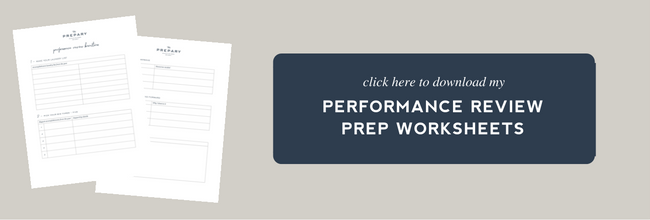As our year comes to a close, I know that many of us will have our yearly performance reviews. Your performance review is one of the most important sit downs you’ll have with your manager all year.
Whether it was a good year, bad year, or great year, don’t go in cold. Both you and your boss play a part in making this conversation productive and successful.
So what makes a successful review conversation?
- You’re able to advocate for yourself and share your big accomplishments from the year
- You’re able to digest important feedback and make sure you and your boss are on the same page about your performance
- Your boss has a clear understanding of what you need to be happy and fulfilled at work in the upcoming year
You may have noticed that these three things are all items you play an active role in. It’s a common misconception that a review is one-sided and because people think this, they walk in unprepared and think their only role is to listen.
While being an active listener is important, participating and engaging in the conversation is critical. With this in mind, here are a few things you should do to prepare for your upcoming review. I also created a free PDF download that will help you go through these steps.
1. Make a laundry list of your accomplishments
The very first thing I want you to do is to sit down and start jotting down some of your big and small wins from the year.
I don’t want you to think too hard about this – the idea is to first do a very fast brainstorm, writing down whatever comes to mind. If you’re having trouble coming up with things, here are a few types of common accomplishments that would be worth noting:
- finished a big project
- figured out a more efficient way to do something
- saved or earned the company money
- met (or exceeded) a goal or metric that was important to your team
- went above and beyond to help a customer, team member, or the company overall
2. Pick your big three (to five)
Once you get going, you’ll probably end up with a pretty big accomplishment list and this next step is to pare it down to the 3-5 most important things you achieved. Write each item down and make some notes on any supporting details you have to back them up.
Here’s an example:
Big win: successfully hired 75 people over the course of the year
Supporting details:
- Hired roles in an average of 45 days which is 15 days quicker than our target
- Received positive feedback from my key business partners
- Filled the particularly challenging roles of x, y, and z
Keep in mind that the big accomplishments you decide to highlight should also be the ones that your manager identified as important. Because maybe I had a ton of fun planning that one lunch-and-learn too, but if it wasn’t a big impact win, it’s not what I should lead with.
3. Identify areas where you’d like to grow
Another part of any review is talking about the stuff that didn’t go as well or areas you need to improve. Don’t let this part of the conversation derail you.
Everyone (and I mean EVERYONE) has something they can improve on. While your manager will share their perspective on this, you should also take the time to reflect on it in advance.
If you identify an area you want to improve in, you should also start to brainstorm the tools and support you need in order to do so. If there is a course you can take, someone on the team you can learn from, or some way your manager can help you, your review is a perfect time to ask for this.
Constantly growing, developing, and improving is something that will make you more and more successful in your career. This is not a part of the conversation to shy away from. Thinking about this in advance will enable you to make sure you and your boss are aligned on these areas as well.
4. Get ready to share what you want going forward
The last thing I want you to think about and be ready to share is what you want out of your job going forward. There is no one out there who is going to be as invested and proactive about your happiness at work than YOU are, so it’s your responsibility to express what you want and why.
While you can’t always control the outcome of this part of the conversation, at the very least it’s important to vocalize these things. The saying “the squeaky wheel gets the grease” is 100% true — particularly when it comes to promotions, raises, taking on more responsibilities, switching jobs, having a flexible schedule, and so much more.
Those who speak up and share what they want are the ones who get it. Don’t just sit back waiting for someone to notice something or read your mind. Doing that is not enough and it will quite literally, cost you.
If something you ask for is met with a firm no, that’s okay. Consider that a jumping off point for a broader conversation. If the answer starts as no, your next statement needs to be, “This is something that’s really important to me. What can I do between now and the middle of the year to make this a possibility.”
Maybe you do need to improve on something before that next promotion can happen – but it’s better to know than not know.
–
Ok team, there you have it – four easy ways you can prepare for your upcoming review. Most reviews tend to happen in the first quarter of the new year so keep this post and worksheet handy and be sure to do your part in making your review a productive one.






